English Words in Action, Group B
(a variety of English words which have developed through history and are currently used in our modern age)
Simply click on this banner (or the following link) and you will be on your way to stimulate your brain for greater word comprehension with quizzes based on some of the words in this unit.
2. A low, continuous sound not necessarily intended to be understood: The speaker shouted his responses to the accusations over the babble of the crowd.
3. The quiet flow or gentle sound of water as it moves along in a river, or in a smaller water way: During the night while camping out, Blaine and Gerda could hear the babble of the stream that was flowing nearby.
2. To engage in a seemingly endless chatter or conversation: Don't babble on the phone all day, Vance, get your assignment done.
3. To make the relatively quiet sound of flowing of water: People always appreciate the water which is continuously babbling in the fountain in front of the city center.
Generally, badgers are burrowing animals that live in clans (groups), or some consist of just one-family units, in the ground with short-thick legs and long-sharp claws on their front feet.
Some clans of badgers average about six members; usually with a dominant boar (male), with one or more sows (females), and their cubs.
A few setts (extensive systems of tunnels and chambers) may have ten or more entrances and are kept clean, maintained, and enlarged over many generations by certain badgers.
Depending on the species of badgers being discussed, some of them have a territory ranging over 125-370 acres (50-150 hectares), which they defend against other clans.
There are at least six different species of badgers in the world which have been identified.
- American badgers are located in South West Canada down to the U.S.A. and into central Mexico. The American species are solitary and prefer open country with loose soil, and they feed primarily on small mammals; such as, prairie dogs and ground squirrels which the badgers dig out from burrows.
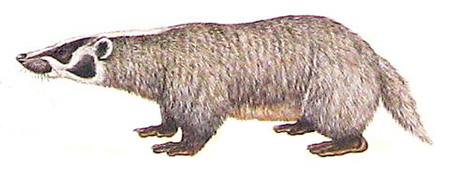
Birds, eggs, and reptiles are also a part of their diets.
In northern parts of their habitats and at high altitudes, the badgers sleep for much of the winter, surviving on their stored fat; but, they do not really hibernate because they become active whenever the weather becomes less frigid.
- Honey badgers are located in west-central-east and southern Africa; as well as, South Asia.
The heavily built honey badgers have long front claws, like most of the other badgers, which are well-adapted for digging.

The food sources of this badger include worms, termites, scorpions, porcupines, and rabbits.
It is stated that they also cooperate with a "greater honeyguide bird" which leads it to bees' nests where the badger tears open the nest to make the honey available so the honeyguide bird can get honey and the badger eats both the bees and the honey.
- Eurasian badgers are one of the few group-dwelling badgers that have small, pointed heads and short necks with powerful bodies, and short, strong legs with a small tail. They inhabit an area of Europe which extends into Japan and South China.
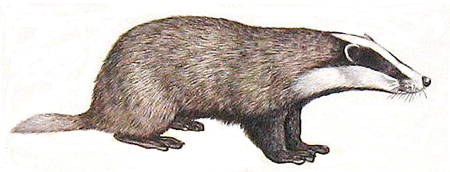
The Eurasian badger lives in family groups in huge burrows with networks of underground passages and chambers with several entrances called a "sett" which is used by many generations of its species who make additions and alterations.
Their bedding material consists of grass, hay, and leaves; all of which are placed in the sleeping chambers and, once in a while, are dragged outside in the early morning to air out.
Around the setts are play areas, and the boundaries of each group's territory are indicated by latrine holes to let other badgers know that they are not welcome to come in.
Nocturnal and omnivorous, this badger varies its diet depending on the season of the year and what is available. Earthworms are their primary food which is supplemented by insects and grubs; as well as, frogs, lizards, small mammals, birds and their eggs, fruit, nuts, and other plants.
- Hog badgers are named as such because of their looks and their habits of rooting for plant food and snuffling in the ground like pigs. The hog badger is an excellent digger, using its very long claws on its front feet to dig into the ground for small animals.
Hog badgers live primarily in wooded regions in uplands and lowlands in North China, North East India, and Sumatra.
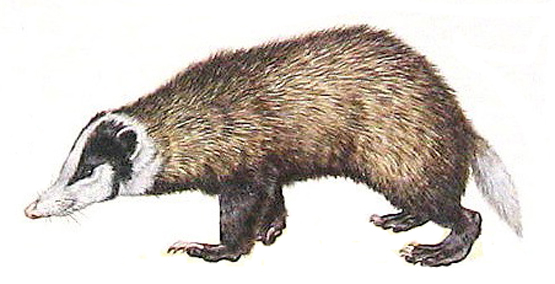
They resemble the Eurasian badgers by being seasonal omnivores with a very wide range of foods, from fruit and honey, to worms and mice.
The hog badgers are distinguished by their white throats and mostly white tails and they move around during the night and then they spend their days in rock crevices or down in deep burrows in the ground.
- Stink badgers live in dense forests in areas of Sumatra, Java, and Borneo and they have powerful gland secretions considered to be particularly powerful and as terrible in odor as those of skunks.
When they are threatened or disturbed by predators, the stink badgers raise their tails and eject a stream of the of the strong fluid.
Stink badgers are nocturnal (night) animals who live in burrows and eat worms, insects, and small animals.
- Chinese Ferret Badgers live in grasslands and open forests ranging in such geographical countries as North East India, South China, Indo-China, Java, and Borneo.
These badgers are like other ferret badgers with their heads strongly patterned with dark and white blotches of hair; they live in burrows or crevices and they are active at dusk and into the night and then they spend their days in old rodent holes or among rock piles; however, they do not dig their own burrows.
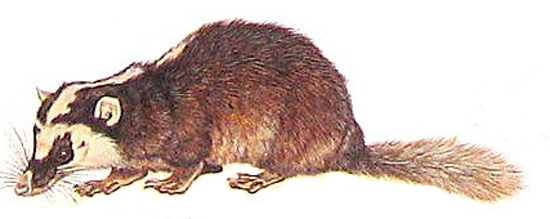
Chinese ferret badgers eat carrion (decaying flesh of dead animals), eggs, fruit, small animals, and worms; however, they are very savage when disturbed or attacked and their anal secretions produce terribly foul-smelling odors as a method of defense or protection.
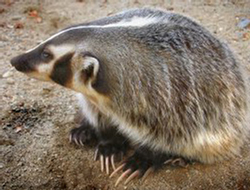
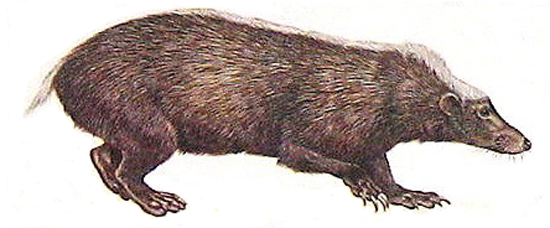
2. To harass, to hound, to pester, or to nag again and again: The lawyer was warned by the judge not to badger the witness by trying to make her testify to something that she doesn't know about.
Mack's mother finally badgered him into getting his hair cut.
When her little girl whined and cried for a lollipop for over an hour, her mother lost her temper and screamed, "Stop badgering me or you will have to go to bed without your dinner!"
3. To bother or to annoy someone with many comments or questions: The reporters and news broadcasters were badgering the comedian about the accusations that were being made about his relations with women in the past.
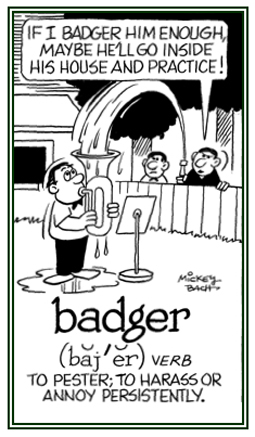
Go to this Word A Day Revisited Index
so you can see more of Mickey Bach's cartoons.
2. To completely confuse or to bewilder other people: Joe was baffled by many of the scientific terms being used in an article he was reading.
Jane's strange behavior was baffling her mother because she had no idea why her daughter was conducting herself that way.
To baffle a man is to defeat him in his efforts to complete something by confusing him.

Go to this Word A Day Revisited Index
so you can see more of Mickey Bach's cartoons.
2. Characteristic of something which is totally confusing or impossible to comprehend: When Barbara refused to study for her final exams, her mother said, “My daughter’s conduct is so baffling that it is inconceivable for me to understand why she is behaving like that!”
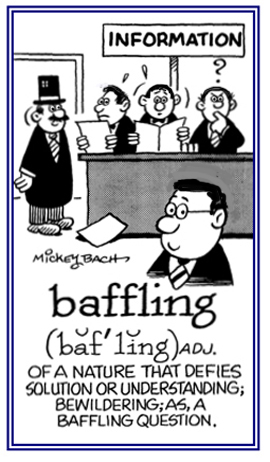
Go to this Word A Day Revisited Index
so you can see more of Mickey Bach's cartoons.
2. A reference to helping someone solve a problem or to leave a difficult situation: Ernie's parents always seem to be bailing him out of trouble.
3. To give or to lend money to a business or an organization to help resolve a financial situation: The U.S. federal government is involved in loaning money to bail out struggling financial, manufacturing organizations, and even some state governments.
2. A person's field of knowledge, work, interest, or authority: Mariam said her bailiwick is not being a public speaker; however, it is the bailiwick of her sister.
Lance's bailiwick is a successful writer of novels.
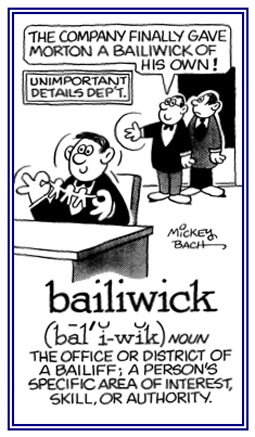
Go to this Word A Day Revisited Index
so you can see more of Mickey Bach's cartoons.
2. The financial support available to a business, etc. to avert a bankruptcy or insolvency: The auto industries are looking to the government for financial bailouts.
2. Etymology: an English 17th-century term for a senseless mixing of beverages; such as, milk and ale; or originally a jumbled mix of liquors (milk and beer, beer and wine, etc.), transferred in 1674 to "senseless jumble of words".
2. Characterized by appearing to be ominous or posing a destructive threat: The winter weather report presented the most baleful possibility of impending danger and a threat of serious harm to several areas of the country.
The baleful clouds and the weather forecasts indicated that a powerful hurricane named "Sandy" could cause significant demolition and wreckage for many people.
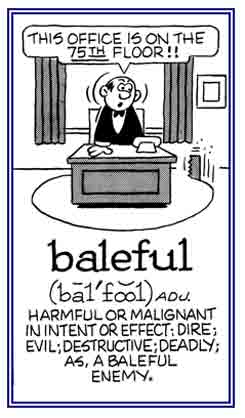
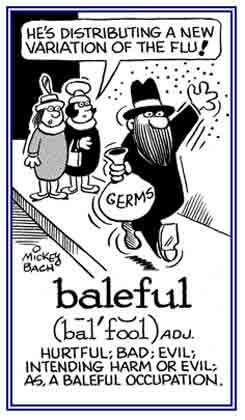
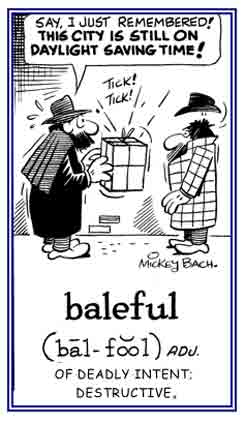
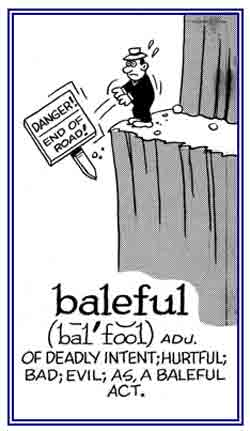
Go to this Word A Day Revisited Index
for a list of additional Mickey Bach illustrations.
Some con men bamboozle a lot of elderly people on the phone by pretending to be relatives who are requesting money for emergencies and the people who pick up funds claim to do this for the pseudo nephews or nieces.
2. To conceal one's real motives; especially, by pretending or feigning good intentions so as to gain an objective: George bamboozled his professors into thinking that he knew their subjects very well.


Go to this Word A Day Revisited Index
so you can see more of Mickey Bach's cartoons.
The mayor of the town recently announced a smoking ban in all public buildings.
Links to all of the groups of English words in action, Groups A to Z.
You may see the bibliographic list of sources of information for these words in action.

